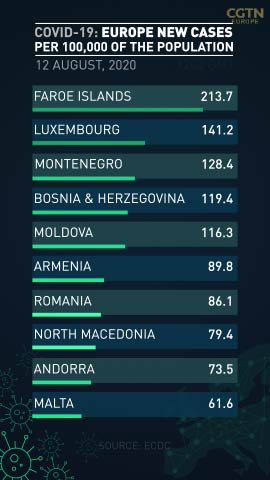TOP HEADLINES
- Germany has agreed on an additional aid package of $1.4bn to help fund holiday firm TUI through to next year, during a tough time for the aviation industry. The new funds are added to the $2.1 billion loan from the government in April.
- UK bank NatWest, has announced it is to cut 500 jobs as it attempts to slash costs amid an expected reduction in loans due to the pandemic. The bank will also close one of its offices in London.
- Norway will reimpose quarantine measures for more travelers arriving from foreign nations in a bid to slow the spread of the virus.
- This year's Paris Marathon, due to take place on 15 November, has been canceled, organizers have said. The race, that involves more than 40,000 runners, has been rescheduled again to enable more athletes to participate.
- The World Health Organization has said it has not received enough information to fully evaluate Russia's new vaccine but urged the country not to introduce it to Brazil until further testing has been carried out.
- The UK economy has officially entered a recession as a result of the pandemic. The economy contracted by a record 20.4 percent between April and June, the country's Office for National Statistics said.
- Germany has expanded its travel warning for Spain to include Madrid and the northern Basque region after a spike in cases in both areas.
- The Netherlands plans to introduce mandatory home quarantine if the public has been in close contact with someone infected, as well as those traveling from high-risk countries.
- Belgium's capital city Brussels has made the wearing of face masks mandatory in all public places after infections rose in the city in recent weeks.
- Bosnia's tourism sector shrank by 70.6 percent in the first six months of 2020. The Balkan country has become more reliant on this industry after growth in recent years, with 1.5 million people visiting in 2019.
- The first quarter-final game of football's UEFA European Champions League is to be played in Lisbon, Portugal, on Wednesday evening. UEFA has released a COVID-19 protocol that outlines the rules and regulations teams must abide by to prevent infection.

This year's Paris Marathon has been canceled. /AFP
This year's Paris Marathon has been canceled. /AFP
We're doing this now so that everyone as soon as possible will be able to live their lives as freely as possible
- Erna Solberg. Norway's prime minister
ACROSS EUROPE
Toni Waterman in Brussels
The Brussels Capital Region has breached the threshold of 50 new coronavirus infections per 100,000 residents, making face masks compulsory in all public spaces throughout the province's 19 municipalities.
There are exceptions for those exercising, performing intense physical work on public roads and for people with a disability. The rate of infection is at 54.4 per 100,000 inhabitants.
Meanwhile, Belgium is plowing $59 million into beefing up coronavirus testing capacities.
The public health institute Sciensano estimates that 70,000 tests will be needed every day as the country heads into the flu season.
The aim is to open more drive-in testing sites like the one opened in Antwerp last week.
Ross Cullen in Paris
France is facing a deteriorating situation regarding the continued spread of the coronavirus, according to the prime minister. Jean Castex says the outbreak in the country is now "evolving in the wrong direction."
With more than 1,000 cases a day and an increase in the number of people being admitted to hospital, Castex criticized "less vigilance, less discipline, less solidarity on the part of some of us."
He announced new measures dedicated to the fight against the coronavirus, including appealing to more local authorities to make masks compulsory in outdoor public areas and extending the ban on gatherings of 5,000 people until at least the end of October.
He said France will bring in a targeted control plan at a local level, with new possibilities for municipalities such as being able to impose partial closures of establishments open to the public.
00:20

Andrew Wilson in the UK
The UK is officially in recession because of the pandemic. New figures confirm what was already known, a record drop between April and June. GDP actually plunged a record 20.4 percent – the biggest quarterly decline in growth since 1955.
Reaction will be muted because it's not a surprise and because the bigger concern is the journey out of recession post lockdown.
Ministers will announce a new plan to avoid the post-exam chaos in Scotland with a new "triple-lock" results system for students taking A levels and GCSEs. The results will be posted tomorrow. Once grades are posted, pupils can appeal the result if their mock exam results were higher or resit the exams in the fall.
Cruise ships moored offshore in the English Channel with nowhere to go have become a tourist attraction in their own right. They're anchored off the coast because there's no room in the ports and it's more expensive anyway.
Stefan de Vries in Amsterdam
On Wednesday, the Dutch House of Representatives is interrupting the summer recess to debate the COVID-19 policy, as the number of infections is increasing rapidly.
Last week there were 4,036 new cases, while in the week before that there were more than 2,500.
To fight the spread of COVID-19, Health Minister Hugo de Jonge announced stricter measures, like a mandatory 14-day quarantine for anyone who has been in close contact with other infected patients.
The minister is also exploring legal possibilities to make it obligatory for infected people to provide a list of all people they have recently met .
The national health authority, RIVM, has purchased more flu vaccines. Because of COVID-19, more people are expected to get a flu shot this year.
Isobel Ewing in Frankfurt
The number of confirmed coronavirus cases in Germany has reached its highest level in more than three months.
Germany's Robert Koch Institute (RKI) for disease control on Wednesday reported 1,226 new cases within 24 hours. The last time infections were higher was on 9 May, when 1,251 new cases were registered.
Health Minister Jens Spahn has called the development "undoubtedly worrying."
"Here we see that due to the return of travel, but also due to parties of all kinds, due to family celebrations in many places in the country, we have small and large outbreaks in almost all regions of the country," Spahn said.
"And, of course, if we don't all pay attention to each other now, this can create a dynamic."
Spahn said everyone in Germany must remain alert. RKI head Lothar Wieler has also warned against carelessness, which causes rising infection rates.
02:52

FROM OUR GLOBAL COLLEAGUES
CGTN Europe podcast: Notes on a pandemic: Science rules
CGTN China: Chinese mainland reports 25 new COVID-19 cases
CGTN America: How COVID-19 has impacted America's farms
CGTN Africa: Tunisia tightens anti coronavirus restrictions on arrival from France, Belgium and Iceland
Sign up here to get the COVID-19 Europe bulletin sent directly to your inbox
CGTN Europe has been providing in-depth coverage of the novel coronavirus story as it has unfolded. Here you can read the essential information about the crisis.